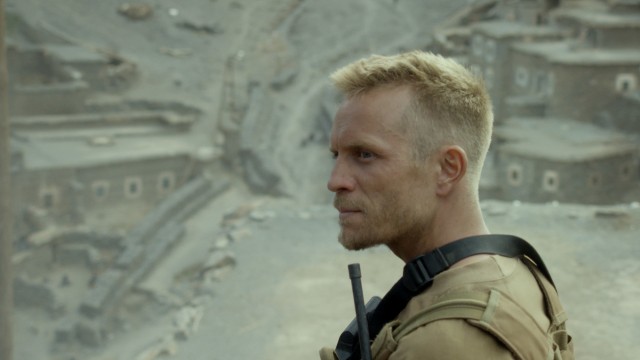
Captain Bonassieu (Jérémie Renier) keeps losing men in mysterious ways in metaphysical thriller
NEITHER HEAVEN NOR EARTH (NI LE CIEL NI LA TERRE) (THE WAKHAN FRONT) (Clément Cogitore, 2015)
Film Society of Lincoln Center, Elinor Bunin Munroe Film Center, Howard Gilman Theater
144 West 65th St. between Eighth Ave. & Broadway
Opens Friday, August 5
212-875-5050
www.filmlinc.org
www.filmmovement.com
 In his photographs, short films (both fiction and documentary), and installations, Alsace-born visual artist Clément Cogitore explores different aspects of faith and ritual, focusing on the nature of the image of the sacred, in nonreligious terms. In his feature-length debut, the existential war thriller Neither Heaven nor Earth, Cogitore breaks through the boundaries of conventional Hollywood storytelling, incorporating several genres as he challenges viewers’ expectations of the sacred ritual that is watching movies. In the mountainous Wakhan Corridor in Afghanistan in 2014, a troop of French soldiers is defending a small village from the Taliban. They are stationed in the middle of nowhere, a vast, empty landscape that ends up serving as a kind of way station that is, as the title states, neither heaven nor earth. At first, the company’s dog goes missing, followed by two of the soldiers. Captain Bonassieu (Jérémie Renier) assumes that the Taliban, led by a nearby tribal leader known as the Sultan (Hamid Reza Javdan), has taken the men hostage and so he insists on their release. But when the Taliban claims that it doesn’t have the men but in fact argues that the French are taking their men, it becomes apparent that something else is going on in the valley, something that cannot be explained — but that doesn’t stop either side from taking up arms and continuing the battle. When the French encounter a young boy (Yashar Vah) who seems to know something about the disappearances, they ask him when men began vanishing. “When the soldiers came?” translator Khalil Khan (Sâm Mirhosseini) says. “No, long before,” the boy answers.
In his photographs, short films (both fiction and documentary), and installations, Alsace-born visual artist Clément Cogitore explores different aspects of faith and ritual, focusing on the nature of the image of the sacred, in nonreligious terms. In his feature-length debut, the existential war thriller Neither Heaven nor Earth, Cogitore breaks through the boundaries of conventional Hollywood storytelling, incorporating several genres as he challenges viewers’ expectations of the sacred ritual that is watching movies. In the mountainous Wakhan Corridor in Afghanistan in 2014, a troop of French soldiers is defending a small village from the Taliban. They are stationed in the middle of nowhere, a vast, empty landscape that ends up serving as a kind of way station that is, as the title states, neither heaven nor earth. At first, the company’s dog goes missing, followed by two of the soldiers. Captain Bonassieu (Jérémie Renier) assumes that the Taliban, led by a nearby tribal leader known as the Sultan (Hamid Reza Javdan), has taken the men hostage and so he insists on their release. But when the Taliban claims that it doesn’t have the men but in fact argues that the French are taking their men, it becomes apparent that something else is going on in the valley, something that cannot be explained — but that doesn’t stop either side from taking up arms and continuing the battle. When the French encounter a young boy (Yashar Vah) who seems to know something about the disappearances, they ask him when men began vanishing. “When the soldiers came?” translator Khalil Khan (Sâm Mirhosseini) says. “No, long before,” the boy answers.
Cogitore, who lives and works in Paris and Strasbourg, transcends the traditional war drama in Neither Heaven nor Earth even as he includes such standard genre elements as a soldier (Kevin Azaïs) too frightened to shoot back at the enemy, dealing with cowardice and a wife (Chloé Astor) back home who is about to give birth; a captain determined to do whatever it takes to get back his men; evening maneuvers shot through night vision goggles; and military commanders who insist on facts, not folklore, but he tweaks them to forward this metaphysical journey that borders on the horror film. Cogitore inserts several scenes that incorporate rituals, from the sacrificing of sheep to a priest who arrives to read passages from the Bible. At one point, a shirtless soldier dances wildly in front of speakers blasting techno music; on his back is a tattoo of a large pair of eyes, staring back at the rest of the company, suspicious of what is going on, unable to see ahead of them. Renier (Saint Laurent, My Way), who was nominated for Lumières and Magritte Awards for his performance, is gritty and intense as Bonassieu, an army captain unable to accept what he is seeing, evoking Gene Hackman as surveillance expert Harry Caul in Francis Ford Coppola’s The Conversation, a man who lets paranoia overwhelm him. Through it all, Cogitore maintains an intriguing subtlety that keeps viewers guessing not only what is happening onscreen but also wondering about the futility of war in general.